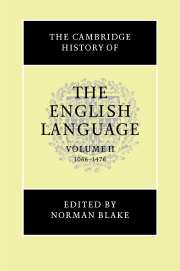6 - THE LITERARY LANGUAGE
Published online by Cambridge University Press: 28 March 2008
Summary
Introduction
The title of this chapter, ‘The literary language’, suggests that there is a clear division between literary and non-literary languages in the Middle English period. As is true of any period in English, there exists a highly literary style at one end of the spectrum and an equally clear non-literary style at the other end, but in between there are so many gradations that it is difficult to draw a precise boundary between them. One can, however, say that if one were to attempt to draw such a boundary, it would for the Middle English period be drawn in a rather different place from the one which we would recognise as appropriate for the modern situation. Today literature is traditionally regarded as both an exclusive and an evaluative term; works which lack an aesthetic structure or an emotional appeal are readily dismissed as being not literature. The growth of a book-buying market has led to literature being advertised and sold as something quite separate from other printed material. The word literature comes ultimately from Latin littera, ‘that which is written’, and this definition reflects Middle English attitudes to literature more adequately than contemporary ones do, though the beginnings of a modern attitude can be traced at the end of the medieval period. It is in the fifteenth century that literary texts like the Canterbury Tales begin to be produced by themselves in de luxe manuscripts as though they were special texts which needed a specialized form of reading. Until that time, and in most cases long afterwards as well, literary texts appeared with other written material in compendia of one type or another. What we would now classify as literary texts do not have a different status in presentation or format.
- Type
- Chapter
- Information
- The Cambridge History of the English Language , pp. 500 - 541Publisher: Cambridge University PressPrint publication year: 1992
- 6
- Cited by

